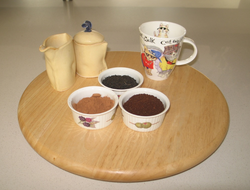Caffeine: What does this nutrient do for you?
Published: April 19, 2019
Caffeine is a naturally occurring nutrient found in a variety of plant foods such as tea leaves, and coffee and cocoa beans.
Caffeine is also added to a variety of beverages, and used as an ingredient in several pharmaceutical medications.
Typical food sources of caffeine include coffee, tea, cocoa, soft drinks, energy drinks and chocolate as well as foods which include theses sources of caffeine as ingredients.
Caffeine is perhaps best understood as a stimulant, but this nutrient may be associated positively or negatively with a variety of physical and neurological conditions such as:
- Physical performance
- Heart disease
- Neurological disease
- Headaches
- Calcium and bone loss
- Sleep disturbances
- Weight loss
- Pregnancy
Caffeine consumption can make some people feel jittery, and result in a rapid heart rate, trembling, stomach upset and diarrhea.
There is no RDA (recommended daily allowance), AI (adequate intake) or UL (upper tolerable level).
However, given that caffeine has the potential to cause adverse health effects in some people a better understanding of this nutrient in relation to your own health status may help you determine how much caffeine you may want to consume.
Stimulant
As a stimulant, consuming caffeine may help to keep you more alert or awake if you are feeling sleepy or sleep deprived. Your brain produces the sedative “adenosine” which binds to brain cell receptors making you sleepy or drowsy.
Typically, adenosine levels are low when you are asleep but increase while you are awake. Shorter periods of sleep result in higher levels of adenosine.
Caffeine is able to temporarily bind to your adenosine receptors blocking adenosine. Unable to bind to these receptors adenosine cannot induce drowsiness which is why you feel more awake after consuming caffeine.
However, if you regularly rely on caffeine to overcome drowsiness you may develop a disturbed sleep pattern and become sleep deprived. This may be particularly so for people who metabolize caffeine more slowly.
Studies show that people who stop consuming caffeine say they sleep more soundly and for longer. Caffeine consumption may also help improve your cognitive performance and how you complete motor...Link to the full article to learn more.
References
1.
Whitney, E. & Rady Rolfes, S. (2005). Understanding Nutrition. Belmont, CA: Thomson Wadsworth
2.
Nutrition for Exercise and sports performance Berning, J.R. In Mann. K. & Escott-Stump, S. (Eds.)(2004). Krause's Food, Nutrition & Diet Therapy. (11th Ed.) Elsevier
3.
Nutrition during pregnancy and lactation Judith K. Shabert. In Mann. K. & Escott-Stump, S. (Eds.)(2004). Krause's Food, Nutrition & Diet Therapy. (11th Ed.) Elsevier
4.
Drug interactions: food drug interactions Pronsky, Z.M. and Crowe, J.P. In Mann. K. & Escott-Stump, S. (Eds.)(2004). Krause's Food, Nutrition & Diet Therapy. (11th Ed.) Elsevier
5.
Centre for Science in the Public Interest: April 2007, December 2012, May 2012, December 2014

